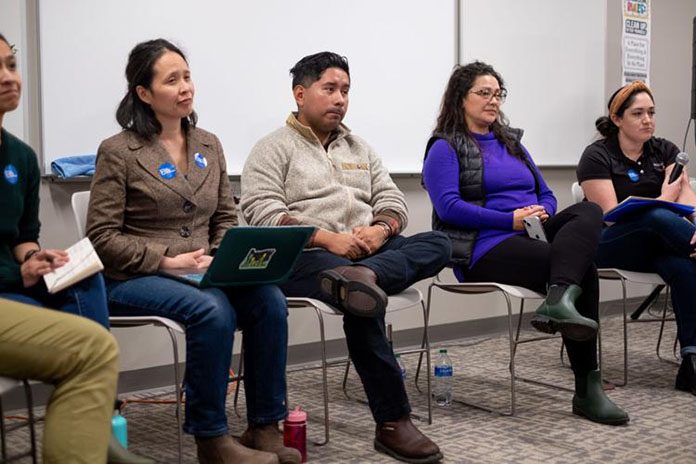
Residents of Boardman sensed increased interest from the Oregon Legislature in the community’s water pollution issues as three members of the House of Representatives visited the city Monday, Nov. 27, for a tour and a public meeting with locals.
The officials — Annessa Hartman, Gladstone, Ricki Ruiz, Gresham, and Khanh Pham, southeast Portland, all Democrats — made the trip from Salem to sense what the nitrate pollution problem was about and the frustration locals face enduring slow government action to help.
Hartman is vice chair of the House Committee on Agriculture, Land Use, Natural Resources and Water.
“I found out about this issue when I first got elected as the vice chair of my committee and immediately was surprised this issue had gone on for so long,”
Hartman commented between a community tour and the following meeting at the Boardman campus of Blue Mountain Community College.
Locals from Boardman and surrounding communities have been enduring the water pollution problems for at least 30 years, according to Oregon Rural Action Executive Director Kristin Anderson Ostrom.
Other parts of the state also have polluted groundwater.
Hartman has not tracked much progress from the government to address the groundwater issues in Boardman.
“It seems like there’s been a lot of promises, and we’re working toward those, but I think we can move faster,” Hartman said.
“As a new politician, I will say the government moves slowly. We need to move faster in this case.”
Pham’s reason for visiting Boardman echoed Hartman’s, saying she wanted to learn more about the situation facing local communities dealing with groundwater pollution.
“I have worked on environmental justice issues for many, many years,” she said.
“I want to bring back what I learned to educate my colleagues who also wonder what the folks have here.
Having done the tour and learned so much, I am very eager to bring what I’ve learned to my colleagues and make this an issue for the Legislature.”
Ruiz also said reporting back to the House of Representatives is an immediate need. “It’s going to take a tremendous amount of partnership between major local commissions, city councils, even the local congressional delegation,” Ruiz said.
“We are not from this area, but we’re learning as much as we can to share it with our colleagues in the legislative body and hopefully make it a priority.”
Ruiz said drafting legislation might provide some solution.
“We’re saying the health and safety of all the residents of Oregon matter,” Pham said. “This is really a fact-finding mission so we can go back to our colleagues and do more research, and discuss with our state agency partners about what are the options.”
Oregon Rural Action, which has organized community meetings, invited the Democrats to Board. ORA has been on the ground in the area to raise awareness about the water crisis.
Oregon U.S. Sen. Jeff Merkley visited Boardman in January, according to Anderson Ostrom, and he was “the first person who’s willing to come and listen to the community,” and then Casey Sixkiller, Region 10 administrator of the Environmental Protection Agency, followed Merkley.
“The EPA was alerted to this problem in January 2020 and they’ve been asking the state to deal with it,” Anderson Ostrom said, “and to get folks to address the immediate health risk.”
There are numerous health hazards associated with groundwater in the area, including cancer and shortened life spans, according to Anderson Ostrom and several residents.
English and Spanish voices populated the meeting.
“We have cross-cultural (residents),” Anderson Ostrom said, “and what they have in common is they are workers in the agricultural economic engine in our region. Unfortunately they are also the ones who have been unknowingly drinking the water for decades.”
Oregon Gov. Tina Kotek visited Boardman on May 3 and promised the community funding for well testing, bottled water and water filters.
Several locals at the meeting complained the bottled water supply was spotty and 5-gallon water bottles were sometimes difficult to handle.
Anderson Ostrom outlined a progression of water issues on a whiteboard, starting with an emergency situation, in which “the main thing we need to do is warn people about what the problem is, and ensuring that they are aware they they should not be drinking the water until it gets tested,” and concluding with a future time when all the drinking water issues are resolved.
“The water situation is an emergency right now, just to get people access to safe water,” she stated. “As the governor said, they can’t be lugging jugs of water forever.”











Your going to have to put in a pipeline system with treated water.
Comments are closed.